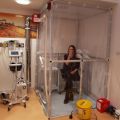Fostering viewed 'positively' by carers' own children
A review of international studies conducted by the Rees Centre for Research in Fostering and Education at the University of Oxford has found that overall the children of foster parents are positive about their parents' decision to foster.
It shows that one significant factor contributing to the success of fostering in families is keeping the children of foster parents involved in the decision-making process.
The review of 17 academic studies from Europe and North America reveals that the extent to which the children were involved in the decision to foster varied a great deal and the perceptions of foster carers and their children in this regard did not always match.
In one study in the US, whereas 90% of foster carers reported having discussed fostering with their children, only 64% of the carers' children said this was the case. The age of the children involved was also a factor, with older children being more likely to participate in the decision-making.
In a Swedish study, around 75% of foster parents' children reported they had a 'very good' or 'rather good' relationship with foster siblings. Foster carers' children often saw themselves as an important part of the successes and failures of the fostering process. In three of the studies, carers' children reported that families felt closer after they started to foster because they perceived themselves as part of the fostering team. According to the parents, fostering increased the caring and empathy skills of their own children and taught them about responsibility.
Some of the studies give a more negative picture, with carers' children reporting that it was sometimes very hard to be in a family that fosters because fostered children took up a lot of family time. Other studies suggested that children and young people perceived that their own problems and needs were not as important as that of the foster children's, so carers' children sometimes tried to help their parents by not telling them about their own problems.
The review finds that ongoing support for families, such as meeting the children of other carers, was helpful. It also finds that the children of foster carers could have benefited from more information from social workers about the specific behaviour of foster children, as well as how family life would change as a result of foster care. The issue of confidentiality was another challenge for the carers' own children as they said they felt they could not tell their peers why their foster brother or sister was acting in a particular way.
Young people suggested that it was sometimes appropriate to have information that could prepare them for disclosures, for instance when foster siblings had been sexually abused before coming to live with the family. While some of the older children said this made it easier for them to react and understand their foster siblings' behaviour, others believed that more information would give them too much responsibility. In one study, 43% said they had experienced fostered siblings telling them secrets and 20% said this troubled them. Most children of carers (70%) said they had experience of knowing things about their fostered sibling that they could not tell their friends.
Director of the Rees Centre for Research in Fostering and Education, Professor Judy Sebba, said: 'If we are serious about keeping good foster carers and we want successful placements of fostered children, this review of international studies demonstrates that fostering providers need to give the children of foster carers really good preparation before their new foster brother or sister arrives. An important role needs to be played by social workers and school staff in addressing the needs of children in the families who foster as well as the fostered children themselves.'
The research centre receives core funding from Core Assets, an independent organisation providing a range of services across the social care sector.
 Amazonia's Fire Crises: Study shows emergency fire bans are insufficient and urges strategic action ahead of the next burning season
Amazonia's Fire Crises: Study shows emergency fire bans are insufficient and urges strategic action ahead of the next burning season
 Study shows that island bats are valuable allies for farmers
Study shows that island bats are valuable allies for farmers
 Study reveals how humanity could unite to address global challenges
Study reveals how humanity could unite to address global challenges
 New Academic Champion for Policy Engagement appointed
New Academic Champion for Policy Engagement appointed
 Breakthrough aerosol human infection model gives hope for future tuberculosis vaccine development
Breakthrough aerosol human infection model gives hope for future tuberculosis vaccine development